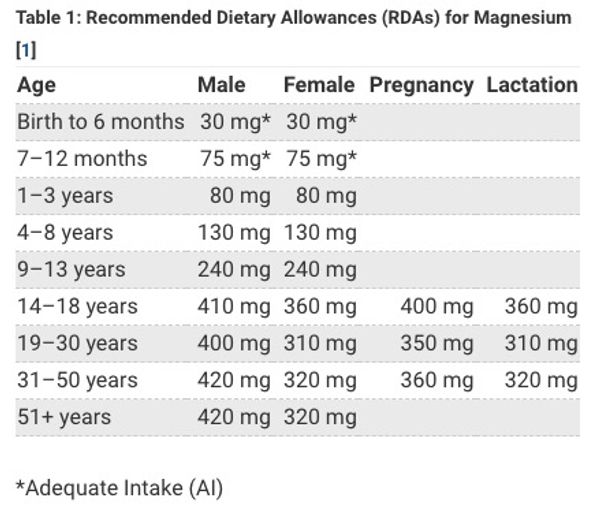
Feeling tired is completely normal, but if you’re constantly exhausted, experiencing muscle cramps, and falling sick frequently, it’s time to look into your magnesium levels.
Meeting our daily magnesium requirements used to be easier in the past. However, the levels of this important mineral in our food have significantly dropped over the years, mainly due to industrial farming.
According to the USDA, approximately 57% of the U.S. population does not meet the recommended daily intake of magnesium.
For instance, the nutritional content of apples in the U.S. decreased by 82% between 1914 and 1992, as confirmed by Swedish physiology expert Rune Eliasson.
Changes in diet also contribute to magnesium deficiency, as many people nowadays don’t consume enough magnesium-rich foods such as beans, seeds, fish, nuts, and leafy greens, which used to be common staples.
Signs of magnesium deficiency
Magnesium is an essential mineral that plays a vital role in numerous biological processes in the human body. It’s the second most abundant mineral inside our cells and is involved in the functioning of over 600 enzymes, as well as regulating several ion channels.
Deficiency of this crucial mineral can lead to various symptoms, including tiredness, muscle weakness, cramps, and irregular heartbeats. It can also cause irritability, shaky hands, tingling, and heart palpitations.

Low magnesium levels can lower potassium in the blood, affect calcium levels, and result in conditions like muscle stiffness or spasms, migraines, and even seizures. In severe cases, it can cause brain damage or, in extreme situations, coma or death.
Here are some of the most common signs that indicate a possible magnesium deficiency:
Muscle cramps
Experiencing cramps in your muscles, particularly in your calves, may indicate a magnesium deficiency.
Try incorporating some magnesium-rich foods into your diet before going to bed. It can work wonders for a good night’s sleep (and your muscles).
Constipation
Magnesium is necessary for the normal functioning of the intestines.
According to the University of Michigan Health, certain medical conditions like irritable bowel syndrome (IBS) can lead to lower levels of magnesium.
A lack of magnesium can cause constipation because the body requires this mineral to soften stool and absorb liquid. Magnesium plays a crucial role in increasing water in the intestines, which can aid in improving bowel movements.
Asthma
Research has shown that increasing magnesium levels in the blood can improve breathing.
The highly respected medical journal The Lancet has also reported on the strong correlation between increased magnesium intake and reduced asthma symptoms.
Numbness
Numbness is often described as a pricky, tingling, pins-and-needles sensation.
Magnesium plays a crucial role in maintaining proper potassium and calcium levels in the body. When magnesium levels are low, it can lead to a drop in potassium and calcium, often causing tingling or numbness in the limbs.
Migraine
People who suffer from migraines often have low magnesium levels, which can enhance muscle tension.
According to a study, additional magnesium intake can counteract nausea, vomiting, and sensitivity to light and sound in individuals with migraines.
Arrhythmia
Irregular heartbeat can be caused by magnesium deficiency.
Magnesium protects blood vessels and can counteract this, according to some researchers.
Depression
Magnesium may play a crucial role in brain function and mood.
Some experts believe that the low levels of magnesium in modern food could be the cause of many cases of depression and mental illness. A 2015 American study of over 8,800 people showed that those under 65 with lower magnesium intake were 22 percent more likely to suffer from depression.
Sleeping problems
Are you having trouble sleeping and often wake up in the middle of the night?
It may be a sign of magnesium deficiency. One way to improve your sleep could be by increasing your magnesium intake. Research suggests that additional magnesium intake can help overcome sleep problems, even though the connection between magnesium and sleep is not fully understood by science yet.
Sweet tooth
If your body is in need of magnesium, it can easily be mistaken as a craving for chocolate or candy. Maintain a regular intake of magnesium through raw nuts, seeds, and fruit to curb your craving.
High blood pressure
Hypertension is a major public health problem in the Western world today.
However, magnesium acts as a natural calcium channel blocker, similar to blood pressure medication.
A large British study from 2013 showed that patients with normal blood pressure can greatly benefit from increasing their magnesium intake.
Joint pain
Many people experience joint pain to varying degrees.
For some people, increasing their intake of magnesium relieves their joint pain. And since increasing magnesium intake has few or no side effects, it’s definitely worth a try.
Chronic fatigue
Magnesium is often recommended for people who suffer from chronic fatigue or generally feel weak.
A Brazilian study found that extra magnesium can not only increase endurance in athletes but also benefit elderly people with chronic diseases.
Calcium deficiency
Magnesium deficiency can also lead to a calcium deficiency, as the body requires magnesium to absorb calcium.
How to increase your magnesium intake
Magnesium supplements are available for purchase at pharmacies or health food stores.
There are different varieties: magnesium chloride (which may taste bitter but is highly recommended), magnesium citrate (a better option for those with heartburn, for example), and magnesium sulfate (perfect for adding to a relaxing hot bath).
The recommended daily intake is 300 milligrams for women and 400 milligrams for men. Before using dietary supplements, remember to consult your doctor.

Foods high in magnesium
- Cocoa: Pure dark chocolate has almost 500 milligrams of magnesium per 100 grams.
- Pumpkin seeds (156 milligrams per serving)
- Chia seeds (One ounce has 111 milligrams of magnesium)
- Dark leafy greens: chard, lettuce, spinach
- Fruit: bananas, apricots, avocados, peaches, plums
- Nuts and grains: almonds, cashews, walnuts
- Legumes: Beans and lentils
- Grains: brown rice, millet, oats
- Potatoes
Please share this information so all your friends can be better at recognizing the signs of magnesium deficiency and increasing their intake of this important mineral!
How to recognize the signs of an impending stroke 8 subtle signs that a person does not clean their home



